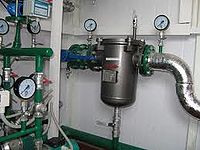Difference between revisions of "Magnetic Elutriators"
| Line 7: | Line 7: | ||
* Please start editing this page after the /noinclude | * Please start editing this page after the /noinclude | ||
* -------------------------------------------------></noinclude> | * -------------------------------------------------></noinclude> | ||
This | [[File:Magnetic Elutriators_1.jpg|thumb|200px|right|Magnetic Elutriators]] | ||
'''Magnetic Elutriators''' n improves the quality of low-grade domestic iron ore by using an alternating-current, pulsed-magnetic field to clean iron ore into a highly refined product. This innovative process differs from conventional drum type magnetic | |||
separation systems by using permanent magnets that cause magnetic entrapment. Drum separators use a less effective, static magnetic field and entrap weakly-magnetic particles, known as middlings, which ultimately contaminate the iron product. The 5R Research technology is a true continuous-counter-current design with a uniform but dynamic magnetic field throughout the system. As crude iron ore enters the system, gravity pulls the magnetically gathered iron ore particle strings downward. | |||
Only rich iron particles move downwards, while tailings particles move upwards. The selective downward movement of the product is assisted by powerful electromagnets that agitate and hold the strongly magnetic ore preventing it from being flushed out of the system. Then, water flushes the weakly magnetic middlings and sandy tailings out of the system. Highly refined iron ore is the final product. This technology is similar in concept to fluidized bed reactors currently used by the chemical processing industry. | |||
Revision as of 23:44, 27 April 2013
Magnetic Elutriators n improves the quality of low-grade domestic iron ore by using an alternating-current, pulsed-magnetic field to clean iron ore into a highly refined product. This innovative process differs from conventional drum type magnetic
separation systems by using permanent magnets that cause magnetic entrapment. Drum separators use a less effective, static magnetic field and entrap weakly-magnetic particles, known as middlings, which ultimately contaminate the iron product. The 5R Research technology is a true continuous-counter-current design with a uniform but dynamic magnetic field throughout the system. As crude iron ore enters the system, gravity pulls the magnetically gathered iron ore particle strings downward.
Only rich iron particles move downwards, while tailings particles move upwards. The selective downward movement of the product is assisted by powerful electromagnets that agitate and hold the strongly magnetic ore preventing it from being flushed out of the system. Then, water flushes the weakly magnetic middlings and sandy tailings out of the system. Highly refined iron ore is the final product. This technology is similar in concept to fluidized bed reactors currently used by the chemical processing industry.
